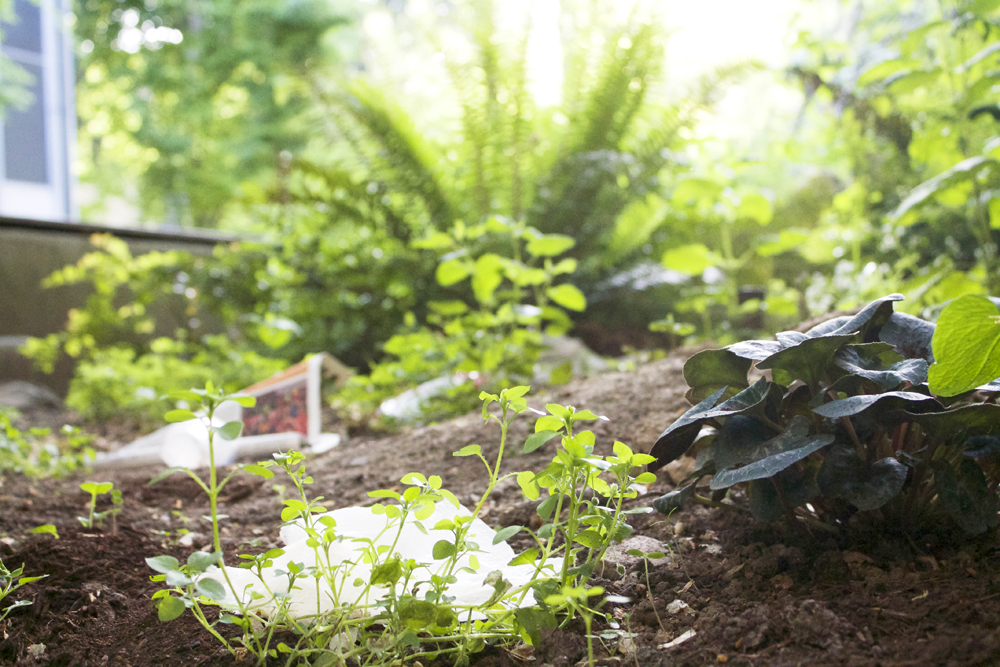A recent change to Portland State’s contract with global food provider, Aramark Services, has raised questions about sustainable and local food options on campus.
Vice President of Finance and Administration Kevin Reynolds signed an amendment to the PSU-Aramark contract on Dec. 10, 2014 that states PSU and Aramark will strive to increase total local and third-party certified food expenditures within each food category by 5 percent annually until the contract expires in 2017.
The food categories cited in the contract include fruits and vegetables; dairy; eggs, frozen, canned and dry; poultry, meat; salmon, tuna and other seafood; and beverages. The contract also outlines provisions for waste reduction.
Health Equity Project Manager Monica Cuneo commented on the 5 percent increase in local and sustainable food purchases on campus.
“That’s a big shift,” Cuneo said. “And that’s not even taking into account what already exists. I think that’s going to have a[n]…impact on the selection and what [PSU] can do to support markets for local farms. And it’s certainly cause for celebration that Aramark is taking on a new element of a contract that’s probably not very standard for them across universities.”
“It’s a partnership and a relationship that has been cultivated,” she continued. “However, there’s always room for growth. [It’s] something to continue to work towards and maintain, monitor and adjust if necessary. If 5 percent is really easy to come to, then we can scale up at a faster pace.”
In 2005, PSU adopted a Declaration of Support for Sustainability, which states: “We, the students, faculty, staff, and administration of [PSU] hereby commit to helping create a more sustainable world…[PSU] recognizes its public responsibility to lead by mobilizing university and external resources to create educational, research and operations programs that are demonstration models.”
PSU’s website describes sustainability as taking an integrated approach to addressing present and future needs while recognizing the interconnectedness of social, environmental and economic systems.
Juan Carlos Rueda Callejas acts as PSU’s Sustainablity Student Ambassador. His position requires up-to-date knowledge of campus sustainablity initiatives. He acts as a liaison between campus sustainability offices and current and prospective students, community groups and sustainability professionals.
Rueda Callejas explained sustainability in the context of food.
“In general, I like to think of [sustainability as] the efficient and responsible use of our livelihoods,” he said. “Food is a little part of the spectrum, since it is the only thing, along with water, that we need to be able to live.”
PSU and Aramark
First-year students living on the PSU campus are required to purchase a PSU Campus Dining Services meal plan. Plan options differ in price depending on the number of meals per week and Dining Dollar funds. The least expensive of these plans is $923 per term for 10 meals per week and includes zero Dining Dollars, according to PSU’s housing and residence website.
The food provided by these meal plans is contracted through global food provider Aramark Services, which PSU has been contracted with since July 2007.
PSU also provides its catering services through Aramark. Student fee-funded student groups hosting events in SMSU, Ondine or Meetro are required to use Aramark.
Exceptions are sometimes made for special events or ethnic food events. In those cases, student groups are required to submit a food waiver request and pay a $20 cleaning fee to PSU.
The Aramark restaurants in PSU’s dining halls include Sbarro, Greens-to-Go, Stir Crazy, Einstein’s Bagels, Zoca Mexican Grill, Starbucks, Miso and Grille Works.
Campus Sustainability Manager Jenny McNamara said the contract amendment reflects certain sustainability practices already in place on campus.
“I think some of the contract change was about acknowledging the good work we were already doing in some aspects,” McNamara said. “I think a strong point for us is local purchasing.”
“There’s still room for improvement,” she continued. “But we’re already at around 40 percent for local food purchases, so that’s not bad. And I think we’re lucky to have access to a lot different food producers here in Oregon and Washington.”
CDS Director Ted McClain said Aramark and PSU’s combined sustainability goals have been ongoing.
“We have always partnered with the PSU Sustainability Department and have ongoing dialogue surrounding the school’s sustainable goals and how we can support and help support those goals and sustainability efforts,” McClain said.
The CDS website outlines several areas in which the department addresses sustainability and social responsibility.
This includes taking steps toward being a Zero Waste dining facility, which means introducing innovation to prevent trash being sent to incinerators or landfills. The website says that 109 tons of food waste were diverted from landfills last year through Ondine Residence Hall’s and SMSU’s composting efforts.
CDS encourages less waste by incentivizing students through a reusable mug discount, and by selling reusable to-go boxes that dining hall employees wash and return to participating students for $4.50.
The department purchases beef from Country Natural Beef cooperative in eastern Oregon and cage-free eggs from Stiebrs Farms in Yelm, Washington, as well as fair-trade products to support sustainable agriculture.
When asked about concerns regarding potential price increases as a result of the contract amendment, McNamara said she does not expect prices to rise in the immediate future, though this could happen eventually.
“Sometimes organic produce, for instance, is more expensive than more traditional methods of producing that food, but sometimes it’s not,” she said. “The market is changing, and things are becoming more equitable in terms of cost. In the next couple of years, for the duration of this contract, I don’t expect the price would increase for students. But eventually we may have to make tougher decisions and figure out how to balance a cost effective but also more sustainable approach.”
STARS sustainability reports
A report submitted to Sustainability Tracking, Assessment and Rating System (STARS) by the Association for the Advancement of Sustainability in Higher Education (AASHE) on April 8, 2015, awarded PSU with a Gold status in sustainability. PSU’s highest rankings are in the categories of research, campus engagement, diversity & affordability, and innovation.
In the food and beverage purchasing category, PSU received 1.64 out of 4 points.
According to the STARS report, 41 percent of PSU’s food and beverage expenditures are spent on local and community-based and/or third party products verified to be ecologically sound, fair or humane.
STARS defines this as food sourced through community-based producers, containing raw ingredients verified as organic or local. It excludes purchases from Concentrated Animal Feeding Operations; products with low nutritional value like soda, chewing gum and candy; and purchases from producers who have been convicted of labor law violations within the past three years.
When compared to other Oregon educational institutions on the same STARS reporting scale, PSU makes greater proportions of local and third-party verified food purchases.
Portland Community College’s report states, “between 26 percent and 30 percent of the total amount Dining Services spends on food each year is spent on products that are produced, grown or manufactured within 250 miles of a PCC campus.”
Oregon State University reports spending 18 percent of its food expenditures in this category, and University of Oregon reports 7 percent.
UofO Food Services manager Tom Driscoll discussed some strategies UofO uses to address sustainability and food on campus.
UofO’s dining services are self-operated. Driscoll also said the university’s local and third-party certified foods are driven by customer preference.
“There’s a robust recycling program here,” Driscoll continued. “We have full composting in all of our pre-consumer and post-consumer food waste.”
“On the food side, we work with a lot of different local vendors—both farmers and producers. One example is Surata Soy Foods, a Eugene company that makes tofu and tempeh. We buy well over 15,000 pounds of tofu.”
Driscoll also mentioned UofO’s relationships with nearby produce farms.
“We buy 4,000 pounds of blueberries at a time and freeze them so we have them throughout the year,” he said. “We’ll buy salad mix and spinach mixes from local farmers when those are in season.”
Student voices: room for improvement
Some students expressed concern over barriers between students and sustainable and healthy food access on campus. These concerns included food quality and affordability, transparency in PSU’s food purchasing and contract negotiations, and validity of third party verification.
Elyse Cogburn serves as Associated Students of PSU’s Sustainability Affairs Director and is part of PSU’s Food Service Committee.
Cogburn said despite the university’s focus on sustainability and the amended contract with Aramark, sustainable food access is lacking on campus.
Cogburn said that because of her ASPSU position, ties to the PSU Student Union and her studies in Environmental Studies and Geography, she often hears students complain about access to healthy and sustainable food at PSU.
“It’s a constant frustration,” she said. “Especially for people with very strict dietary needs like I have, there are no options through PSU or Aramark—there are no options for me to eat.”
Rueda Callejas mentioned Green Roots Café as a source for sustainable food.
“On campus, our Student Incidental Fees helped re-open the Green Roots Café, which is a sustainability-focused café, with affordable food options, and addresses the Food Sustainability issue at multiple levels,” Rueda Callejas said.
Cogburn said Green Roots Café’s options for increasing sustainable food access are limited because the café is funded by student fees.
“Green roots is very limited with what they can and can’t do,” Cogburn said. “I was part of the final planning stages, and it’s hard when Green Roots is a Student Operated Service and is subject to SFC dollars for its funding.”
“I would say sustainable, local and healthy food is very limited on campus,” Cogburn said. “We’re lucky enough to have food carts on this campus. That’s something that’s really great about PSU, but it’s also not as affordable.”
She added that on-campus food carts are not contracted with Aramark, so students enrolled in meal plans cannot eat there using their Dining Dollars.
PSU student Andrew Mautz expressed similar concerns about sustainable food access on campus.
Mautz has been involved in several campus projects related to sustainability. He is an organizer for PSUSU, Co-Chair of the Food Action Collective, a member of the PSU Village Building Convergence Orchard Team and the Sustainability Leadership Center’s Garden Intern Program. He is also a former employee of Green Roots Café, and a caretaker for the Grazing Garden, formerly Food For Thought Café’s garden space.
“I’ve heard about [the contract amendment] but I don’t really have much faith in that being a real positive change at PSU,” Mautz said. “I feel like local and organic have become buzzwords now, rather than meaningful terms. In general, Aramark is not a sustainable company in any aspect.”
Mautz emphasized the social aspect of sustainability, pointing out concerns over Aramark employee wages.
“We need to be thinking about sustainability from a social aspect as well,” Mautz said. “In discussions about sustainability, too often the social side is left out.”
The efficacy of third-party certification has come into question as well.
“In many cases even organic produce will still be exposed to toxic agricultural chemicals because they’re using things that haven’t been officially recognized by organic certification standards,” Mautz said.
According to the U.S. Department of Agriculture website, the USDA only prohibits the use of certain pesticides on organic certified crops.
Cogburn said the sustainable catering menu is unrealistic for student groups to be able to afford within their budgets. Aramark’s sustainable catering menu options are priced at $12.99 per person and higher, which in some cases is higher than Student Fee funded groups are permitted to spend per person at events.
“The initial problem is that prices are absurd,” Cogburn said. “But also I have an issue with their sustainable box lunches. The menu says everything is individually wrapped. If everything is individually wrapped, how is that sustainable? I understand with food allergies they’re trying to keep everything separate—but if they’re each wrapped with plastic, how is that supposed to be sustainable?”
“I think when people think of sustainability or sustainable food, they think organic: healthy, fresh, spinach, green, salmon, etc.,” Cogburn continued. “They don’t realize that sustainability is much more than that. It encompasses economic, social, environmental issues. Those do not line up at all with what this [sustainable] menu is.”
Cogburn said she would like to see greater transparency for students in regard to contract negotiations and food service.
“It falls back on Aramark,” Cogburn said. “They need to hold forums or conversations just so students know who Aramark is and what they do…Give them a chance to communicate and engage.”
Mautz expressed similar concerns over transparency.
“I believe transparency is definitely something to be concerned about, especially with a large corporation like Aramark that has not always been a great company,” Mautz said. “I feel like that’s something that should be pushed for—a high level of transparency so people know where this food is coming from. It’d be great if this information were a lot more accessible so people can readily access [it].”
McNamara said CDS and the Campus Sustainability Office are now carrying out detailed tracking of food purchases, including catering, retail and dining hall purchases.
When asked about student perception of sustainable food access on campus, McNamara said CSO faculty often hear from students concerned about food options on campus.
“We also tend to hear from the students who are already connected to other sustainability initiatives,” she added. “So I think if students really want to see change on campus they need to make their voices heard.
“I think it would be great to have some sort of survey of student perceptions on campus to help inform decisions a little bit more,” she continued. “I mean, we certainly do hear from a lot of students who are concerned about the sustainability for their food options, but again that might be a fraction of the student perception on campus.”
Future of food at PSU
McClain said Aramark would like to continue its partnership with PSU after its contract expires in 2017.
“With the university’s future expansions—including the 2020 Plan—Aramark is positive that we can work with PSU to update and grow the offerings to keep in line with what is important to our students,” McClain said.
McClain said he’s also seeing an increase in students who prefer vegan and vegetarian diets, and Aramark is trying to evolve along with students’ needs.
Cogburn emphasized the importance of being engaged with PSU’s food vendors and contractors.
“As we strive to be a sustainable institution, we have to look at who we contract with and who they are,” Cogburn said. “Do they line up with the institution’s mission? Are we really being served?”
Additional reporting by Elizabeth Hendrickson.
Editor-in-cheese





